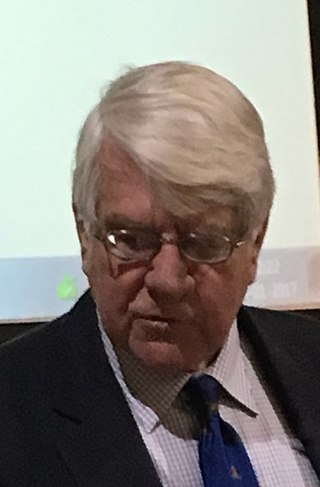Related Research Articles

The University of California,San Francisco (UCSF) is a public land-grant research university in San Francisco,California. It is part of the University of California system and is dedicated entirely to health science and life science. It conducts research and teaching in medical and biological sciences.
Arthur Michael Kleinman is an American psychiatrist,social anthropologist and a professor of medical anthropology,psychiatry and global health and social medicine at Harvard University.
Jack A. Goldstone is an American sociologist,political scientist,and historian,specializing in studies of social movements,revolutions,political demography,and the 'Rise of the West' in world history. He is an author or editor of 13 books and over 150 research articles. He is recognized as one of the leading authorities on the study of revolutions and long-term social change. His work has made foundational contributions to the fields of cliodynamics,economic history and political demography. He was the first scholar to describe in detail and document the long-term cyclical relationship between global population cycles and cycles of political rebellion and revolution. He was also a core member of the "California school" in world history,which replaced the standard view of a dynamic West and stagnant East with a ‘late divergence’model in which Eastern and Western civilizations underwent similar political and economic cycles until the 18th century,when Europe achieved the technical breakthroughs of industrialization. He is also one of the founding fathers of the emerging field of political demography,studying the impact of local,regional,and global population trends on international security and national politics.

Orley Clark Ashenfelter is an American economist and the Joseph Douglas Green 1895 Professor of Economics at Princeton University. His areas of specialization include labor economics,econometrics,and law and economics. He was influential in contributing to the applied turn in economics.

Omer Bartov is an Israeli-born historian. He is the Samuel Pisar Professor of Holocaust and Genocide Studies at Brown University,where he has taught since 2000. Bartov is a noted historian of the Holocaust and is considered one of the world's leading authorities on the subject of genocide. The Forward calls him "one of the foremost scholars of Jewish life in Galicia."
Harry Eugene Stanley is an American physicist and University Professor at Boston University. He has made seminal contributions to statistical physics and is one of the pioneers of interdisciplinary science. His current research focuses on understanding the anomalous behavior of liquid water,but he had made fundamental contributions to complex systems,such as quantifying correlations among the constituents of the Alzheimer brain,and quantifying fluctuations in noncoding and coding DNA sequences,interbeat intervals of the healthy and diseased heart. He is one of the founding fathers of econophysics.
Richard Ainley Easterlin is a professor of economics at the University of Southern California. He is best known for the economic theory named after him,the Easterlin paradox. Another of his contributions is the Easterlin hypothesis about long waves of baby booms and busts.
Christopher Sandy Jencks is an American social scientist.

Lawrence D. Bobo is the W. E. B. Du Bois Professor of the Social Sciences and the Dean of Social Science at Harvard University. His research focuses on the intersection of social psychology,social inequality,politics,and race.
B. Douglas Bernheim is an American professor of Economics,currently the Edward Ames Edmunds Professor of Economics at Stanford University;his previous academic appointments have included an endowed chair in Economics and Business Policy at Princeton University and an endowed chair in Insurance and Risk Management at Northwestern University’s J.L. Kellogg Graduate School of Management,Department of Finance. He has published many articles in academic journals,and has received a number of awards recognizing his contributions to the field of economics. He is a partner with Bates White,LLC an economic consulting firm with offices in Washington,D.C.,and San Diego,California.

Meenakshi Wadhwa is a planetary scientist and educator who studies the formation and evolution of the Solar System through the analysis of planetary materials including meteorites,Moon rocks and other extraterrestrial samples returned by spacecraft missions. She is director of the School of Earth and Space Exploration at Arizona State University. She is also a research associate at Field Museum of Natural History in Chicago.
Panagiota Daskalopoulos is a professor of mathematics at Columbia University whose research involves partial differential equations and differential geometry. At Columbia,she also serves as Director of Undergraduate Studies for mathematics.
Myron Kent Jennings is an American political scientist best known for his path-breaking work on the patterns and development of political preferences and behaviors among young Americans. He is widely held in libraries worldwide and is recognized as one of the "founding fathers" of political socialization research and theory. He is Distinguished Professor of Political Science at the University of California,Santa Barbara and Professor Emeritus of Political Science at the University of Michigan. He was elected to the American Academy of Arts and Sciences in 1982,and served as the president of the International Society of Political Psychology in 1989–1990 and as the president of the American Political Science Association in 1997–1998.
Vale Leonard Broom also known as Leonard Bloom,was an American sociologist whose career spanned seven decades. He was known for his research on discrimination and social inequality,which began with his studies on the effects of Japanese internment.
William Dan Rohwer Jr. was an American educational psychologist.
Daniel Lee Rubinfeld is an American economist specializing in public economics and law and economics. He is a professor of law at the New York University School of Law,as well as the Robert L. Bridges Professor Emeritus of Law and Professor Emeritus of Economics at the University of California,Berkeley. He is the author of two textbooks:Microeconomics and Econometric Models and Economic Forecasts.
Stephen Gates Lisberger is an American neurobiologist. He is the George Barth Geller Distinguished Professor for Research and chair of Neurobiology at the Duke University School of Medicine.
References
- ↑ "Richard A. Leo". University of San Francisco. Retrieved 2023-01-08.
- ↑ "Richard A. Leo". John Simon Guggenheim Memorial Foundation. Retrieved 2023-01-08.
- ↑ "Richard Leo". Center for Advanced Study in the Behavioral Sciences. Retrieved 2023-01-08.